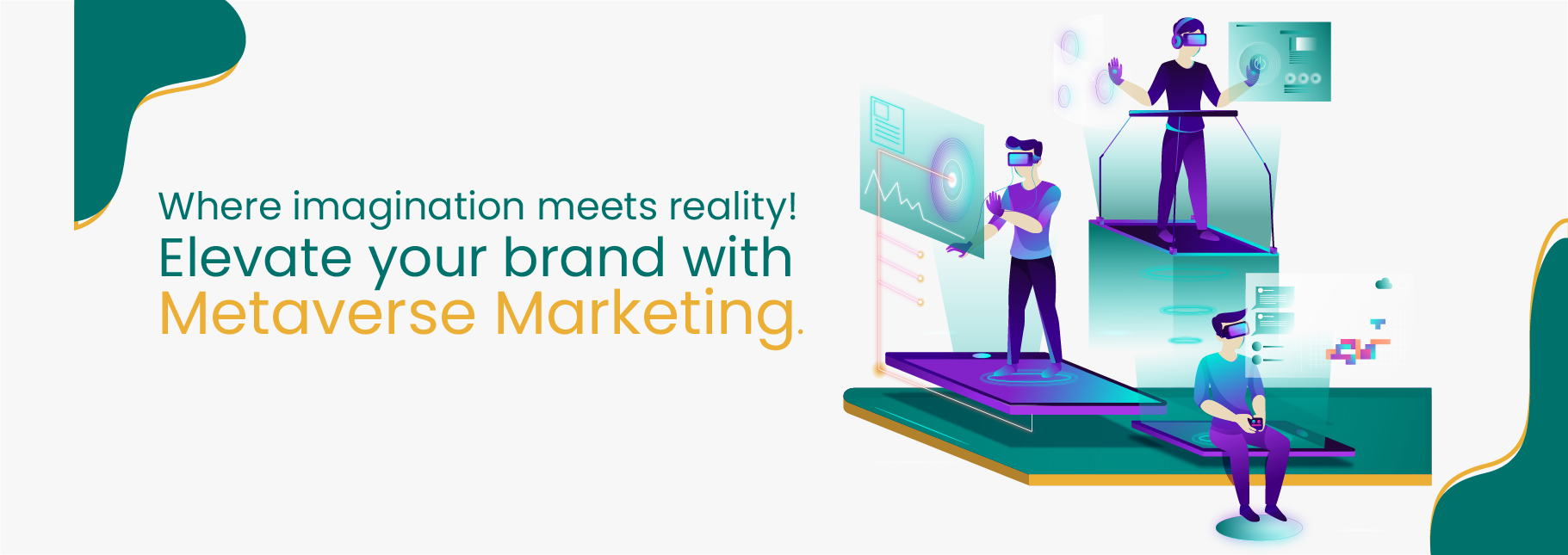“Enter the Metaverse: The Ultimate Frontier in Digital Marketing to Boost Your Brand’s Reach and Engagement”
Digital Marketing in Metaverse?
The Metaverse is a simulated digital space that provides users with the ability to create their own 3D environments and explore them as if they were in an alternate reality. Users can customise their avatar to represent themselves or even take on the form of iconic characters from popular franchises. Additionally, users can collaborate with others or join groups for activities like multiplayer gaming or online art galleries. The Metaverse also offers monetization options for creators, allowing them to make money by selling virtual items or services within the platform. Overall, the Metaverse is an incredibly unique space that allows users to express themselves and connect with each other in an entirely new way.
It is an innovative virtual reality space that offers immense potential for digital marketing. Digital marketing in the metaverse provides brands with opportunities to boost their reach, engagement, and create immersive experiences that are impossible to replicate in the physical world.
Metaverse in Digital Marketing:
Digital marketing in the metaverse allows brands to create immersive experiences that are impossible to replicate in the physical world. From virtual product launches to immersive brand experiences, the metaverse offers a range of opportunities for brands to engage with their audiences. Brands can leverage the metaverse to create interactive experiences that allow customers to experience products and services in a whole new way. It is a virtual universe where real people are represented by digital avatars, blurring the lines between physical and digital worlds and affecting how people shop, socialize, learn, play, work, and interact with brands.
Moreover, digital marketing in the metaverse provides brands with access to new advertising channels. As the metaverse grows, new advertising channels are emerging, enabling brands to reach their audiences in innovative ways. From in-world advertising to product placement, the metaverse is opening up a whole new world of advertising possibilities.
Engagement is a key metric for any digital marketing strategy, and the metaverse is an inherently social space. This means that users are more likely to engage with content and with other users. By creating engaging experiences in the metaverse, brands can increase their engagement levels and build stronger relationships with their customers.
How can companies use the metaverse to promote their brand?
The metaverse provides companies with a multitude of opportunities to promote their brand in unique ways, including the creation of custom digital spaces, immersive experiences, and digital collectibles aimed at engaging with their target audience. With a plethora of marketing possibilities already available in the metaverse, companies can use it to build their brand and reach new customers. By entering the metaverse, brands can access a global audience and create immersive experiences that engage their customers on a whole new level. The metaverse is a fully immersive experience that blurs the line between the physical and digital worlds, providing brands with innovative ways to connect with their audiences.
Additionally, companies can seek input from their agency team to develop a plan for how their brand should be represented in the metaverse and when it would be appropriate to do so. A comprehensive marketing guide is also available, providing examples, best practices, and job opportunities in the metaverse marketing space.
To enter the metaverse successfully, brands must identify their goals and choose the right platform. There are various metaverse platforms to choose from, each with its own strengths and weaknesses. Some platforms are designed for gaming, while others are focused on social interaction. Brands must select a platform that aligns with their goals and target audience.
Exploring Brands That Successfully Engaged Their Customers with Metaverse Experiences:
Nike: Nike created a virtual world in the metaverse, where users could design their own sneakers and explore a futuristic city. The experience was designed to promote their new Air Max line and generated a lot of buzz around the brand.
Gucci: Gucci launched a digital-only collection of virtual sneakers, which users could purchase using their digital wallets. This innovative approach to e-commerce generated a lot of excitement among fans of the brand.
Red Bull: Red Bull created a metaverse racing game, where users could control virtual cars and compete against each other. The game was designed to promote their brand as a leader in extreme sports and energy drinks.
Coca-Cola: Coca-Cola created a virtual island in the metaverse, where users could explore and participate in activities like beach volleyball and surfing. The experience was designed to promote their brand as a fun and refreshing choice for summer.
The Weeknd: The Weeknd launched an immersive concert experience in the metaverse, where users could attend a virtual concert featuring the artist. The experience was designed to promote his new album and provided an innovative way for fans to connect with the artist in a socially distanced world.
How to measure performance in the metaverse?
To measure success in the metaverse, we need new digital indicators and data tracking methods beyond traditional metrics. KPIs are essential to evaluate virtual stores and make data-driven decisions. However, measuring success in the metaverse poses unique challenges due to identity resolution issues. Therefore, brands need to develop new methods to measure their metaverse marketing performance.
Challenges Digital Marketers May Encounter in the Metaverse
Marketing in the metaverse poses several challenges such as deciding which metaverse to target, understanding user engagement, and measuring performance. Similarly, users face challenges like privacy, anonymity, content overload, and FOMO. Marketers also face challenges like security, payment methods, user experience, and defining the metaverse itself. Overcoming these challenges is essential for successful metaverse marketing.
Is Metaverse the future of digital marketing?
Although still in its developmental stage, the metaverse is expected to reach an $800 billion market valuation by 2024, signalling significant growth potential. As technology continues to evolve, more people are expected to join the metaverse, with influential figures like Mark Zuckerberg focusing on developing augmented reality (AR) and virtual reality (VR) technology. Metaverse marketing is being touted as the next-generation digital marketing because it offers individuals an immersive 3D experience. The metaverse provides brands with an opportunity to create engaging and personalised experiences for customers, leading to entirely new ways of interaction and customer engagement. It is therefore reasonable to conclude that the metaverse will play a crucial role in the future of digital marketing.
In conclusion, digital marketing in the metaverse is an exciting frontier that offers immense potential for brands. By entering the metaverse, brands can reach a global audience, create immersive experiences, increase engagement, and access new advertising channels. Brands must develop a strategy that aligns with their goals and target audience to maximize the potential of the metaverse.










